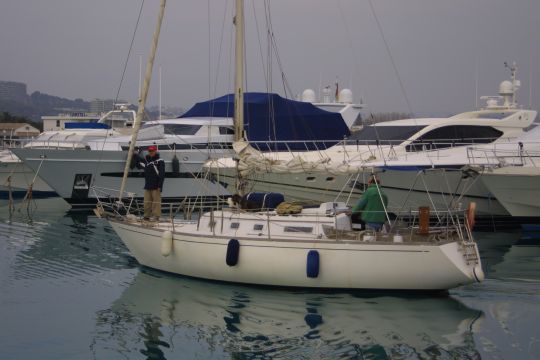Sailing with several people on the same boat, while sharing costs, may seem an ideal solution. However, nautical co-ownership requires a well-honed discipline. Here, amateur sailors share their experiences, to enlighten future co-owners.
Meticulous organization for boat use

" We used a shared Google Calendar to book our slots, but soon had to establish a half-yearly schedule to avoid conflicts over long weekends." explains Paul, co-owner of an Edel 26. Usage has to be fair, proportional to the share held, but also flexible. Some opt for strict alternation (even/odd weeks), others for a rotating calendar. The most important thing is transparency.
Allocate costs according to established rules

Fixed costs (berths, insurance, careenage) are generally shared out on a pro rata basis. " We've set up a common fund that is replenished on a quarterly basis. We stick to it, otherwise it creates tensions "says Esouard, co-owner of a First 24 in La Rochelle. For exceptional expenses, joint validation is recommended. " Changing the mainsail is not something you decide on a whim "notes Jean, co-owner of a Sun Fizz.
Anticipating maintenance disagreements

Tinkering together is often the ideal on paper. " But beware of differences in level and involvement "says Georges, former co-owner of a Lavezzi. Some prefer to call in professionals, others want to do everything themselves. Hence the importance of a set of rules specifying who does what, and how tasks or bills are shared.
Securing relations with co-ownership regulations

The boaters surveyed agree: the absence of a clear contract is the primary source of failure. " On our first boat, we didn't write anything down. As a result, the first hitch sent the whole thing into a tailspin "André remembers. A good set of rules sets out the periods of use, maintenance rules, collective decisions, claims management, and above all the procedures for leaving or reselling shares.
A mindset compatible with sharing

Finally, beyond the legal and financial aspects, it's the state of mind that counts. " You have to know how to put water in your wine and accept that the other person doesn't do everything the same way as you do "says Odile, co-owner of a small sailboat in Brittany. Co-ownership works if the members share a compatible vision of sailing and boat management. Otherwise, it's best to abstain.
Co-ownership of a sailboat is not a universal solution, but it can become a successful collective adventure, provided a clear framework is established from the outset and constant dialogue is maintained between the partners.

 /
/ 







